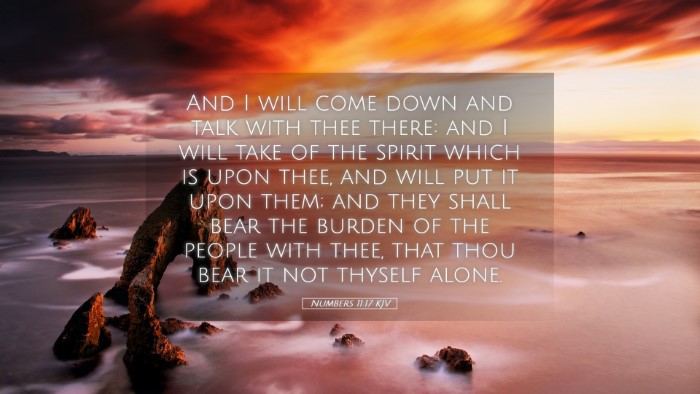Commentary on Numbers 11:17
"And I will come down and talk with you there; and I will take of the spirit which is upon you, and will put it upon them; and they shall bear the burden of the people with you, that you bear it not thyself alone." (Numbers 11:17, KJV)
Introduction
This verse is pivotal in understanding God's provision for leadership among His people. Here, we find the Lord addressing Moses’ complaints regarding the burdens of leadership and His response reveals much about divine empowerment and the sharing of responsibilities.
Contextual Background
The book of Numbers outlines the experiences of the Israelites in the wilderness, focusing significantly on their complaints, trials, and God's continued faithfulness. In chapter 11, the people of Israel express discontent about their journey and the manna provided to them. This discontent leads Moses to speak to the Lord about the overwhelming burden of leadership.
The Burden of Leadership
Moses' plea for assistance reveals the heavy weight of leadership, even when chosen by God. Commentators like Matthew Henry note that Moses felt the strain of guiding a rebellious people. Albert Barnes emphasizes that the responsibilities became unbearable, prompting Moses to question why he was singled out for this responsibility.
- Moses’ Desperation: His request highlights his human limitations and the extent of the people's discontent.
- Divine Response: God's reply is compassionate; it reflects His understanding of human frailty.
God's Assurance and Provision
The Lord’s promise to come down and speak with Moses is significant, as it underlines God's willingness to intervene. According to Adam Clarke, this divine interaction marks a moment of impartation where God's Spirit is shared to alleviate leadership burdens.
In this context, the “spirit” that God takes from Moses signifies the divine enablement necessary for leadership. The imparting of the Spirit to the seventy elders not only expands the leadership but brings spiritual guidance and authority, critical for managing a large congregation.
Empowerment Through Community
The concept of shared leadership is evident here; God intends for the burden to be distributed among others rather than shouldered alone. This points to an essential principle in church leadership and community organization.
- Shared Responsibility: Leaders are not to be isolated in their struggles but should engage others in their mission.
- Collaborative Ministry: The empowerment of the seventy elders illustrates how community is strengthened when leadership is shared.
Theological Insights
This verse serves as an illustration of God's provision for His servants, showcasing His readiness to equip them for the tasks at hand. The transformation from an individual burden to collaborative leadership is a core theological insight. It reflects God's desire for community in ministry.
God’s Provision
As noted by Matthew Henry, God’s promise to Moses reassures us of His ongoing support in fulfilling divine mandates. This affirms the belief that God equips those He calls.
Role of the Holy Spirit
The transfer of spirit anticipates New Testament themes of the empowerment of believers. The significance of the Spirit's role in guiding and equipping leaders remains vital in contemporary theology.
Practical Applications
For pastors, students, and theologians, Numbers 11:17 offers valuable lessons on leadership, community, and divine empowerment. The following points may guide practical application:
- Recognize Limits: Leaders should acknowledge their limitations and seek counsel and support within their congregations.
- Encourage Collective Leadership: Churches should cultivate environments where multiple leaders can emerge, sharing responsibilities and visions.
- Dependence on God: Like Moses, leaders should intimately rely on God's provision and guidance for strength and wisdom.
Conclusion
In conclusion, Numbers 11:17 powerfully encapsulates themes of burden, community, and divine empowerment. Through God's provision, Moses gains relief—theological implications extend to the nature of leadership within the Church, encouraging shared responsibility and reliance on the Holy Spirit. As we delve deeper into this text, let us draw from its wisdom to guide contemporary leadership practices in a manner that honors God's design for His people.
“The church is strongest when its leaders are endowed with the Spirit collectively, bearing the burdens of ministry together.”


